 |

|

|
|
|
An up close and personal interview with U.S. Army Veteran and Togetherweserved.com Member:
SFC Steve Verno U.S. Army (Ret) (1972-1992)
PLEASE DESCRIBE WHO OR WHAT INFLUENCED YOUR DECISION TO JOIN THE ARMY?
 In 1972, my dad told me to get in the car and we were going on a drive. He took me downtown, dropped me off and told me to have a good life. I was left with no clothes, no money and no future. I was across the street from the Army Recruiting Office. I went in and found myself in the Army. The day was spent taking tests and sitting on a bus headed for Fort Dix. In 1972, my dad told me to get in the car and we were going on a drive. He took me downtown, dropped me off and told me to have a good life. I was left with no clothes, no money and no future. I was across the street from the Army Recruiting Office. I went in and found myself in the Army. The day was spent taking tests and sitting on a bus headed for Fort Dix.
WHETHER YOU WERE IN THE SERVICE FOR SEVERAL YEARS OR AS A CAREER, PLEASE DESCRIBE THE DIRECTION OR PATH YOU TOOK. WHAT WAS YOUR REASON FOR LEAVING?
When we got off the bus at Fort Dix, we were taken to the mess hall where I had a cheeseburger. I saw a vial of what looked like salt and it had something mixed with it. I thought it was saltpeter because some of the guys on the bus
 |
| Army Medic |
said that they give you saltpeter to keep you from becoming amorous.
My grandfather once told me that if I found myself in the Army, keep my eyes and ears open, keep my mouth shut and do exactly what I've been told to do. During an inspection, the Company Commander told me I wouldn't make it in the Army. I decided to show him he was wrong. I was one of three Soldiers who passed Basic Training. While the Company was taking the tests again, I was cleaning M-16s. The Company Commander came out and handed me a pair of PV2 stripes and told me to put them on.
From Fort Dix, I went to Fort Sam Houston for medical training. I was made Company Guideon which was an honor position. I made it through AIT and was promoted to PFC. I went home on leave and stopped at the recruiting station. The Sergeant that I met was surprised to see me as a PFC after 4 months in the Army.
I went to Fort Carson and was assigned to the 2nd Bn, 20th Field Artillery. I was issued a colored pocket patch and a red baseball hat. I still have the patch today. There I learned more about being a Medic than I was taught at Fort Sam. I was a Battery Medic and earned the title of Doc.
I had my own private room next to the aid station which meant if someone was hurt or sick at night or on weekends, I was expected to take care of them. One night, while out with friends in the barracks, a car crossed the median and hit our car head on. I was nominated for the Soldiers Medal for saving the other driver's life. It was knocked down to an ARCOM.
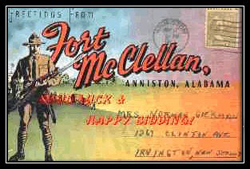 After reenlisting, I went to Fort McClellan, Alabama where I was assigned to the 4th Surgical Hospital later renamed 4th Combat Support Hospital. I was also sent TDY with the 111th Military Police Company. Being an MP was nice. Ft McClellan was a pretty quiet post and not much happened. Most of the time was spent driving around keeping an eye out for any problems. When my TDY ended I was sent to Atlanta, Georgia where I with my fellow medics, Janet Harp and Cindy Green gave hearing and eye tests to the kids of the Atlanta Public School System. Today, those kids are probably grown up with kids of their own. In the summer of 1975, I was sent TDY to the WAC swimming pool. After reenlisting, I went to Fort McClellan, Alabama where I was assigned to the 4th Surgical Hospital later renamed 4th Combat Support Hospital. I was also sent TDY with the 111th Military Police Company. Being an MP was nice. Ft McClellan was a pretty quiet post and not much happened. Most of the time was spent driving around keeping an eye out for any problems. When my TDY ended I was sent to Atlanta, Georgia where I with my fellow medics, Janet Harp and Cindy Green gave hearing and eye tests to the kids of the Atlanta Public School System. Today, those kids are probably grown up with kids of their own. In the summer of 1975, I was sent TDY to the WAC swimming pool.
I left Ft McClellan for Germany. I was assigned to Pinder Barracks in Nuremberg. It was a tiny post where all of the Medics worked in a small troop clinic. Instead of pulling CQ in the unit, we pulled CQ in the clinic where we took care of sick and hurt Soldiers at night and on weekends. When I wasn't working, I went on Volksmarches and saw a ton of Germany and made friends with the locals. I also loved the beer. I haven't had a beer since leaving Germany.
I had a friend named Al Babbich who was the unit NBC NCO. He went to the German Brewery and bought a keg of their beer. He carpeted the outside and used it as a foot cushion. The Army shipped it stateside with his household goods. I met him at Fort Sill where he opened the keg.
From Germany, I went to Fort Sill where I was assigned to the 2nd Bn 37th Field Artillery. This place was Tornado Alley. I spent my weekends with the American Red Cross helping people who survived a tornado. I was finally promoted to SSG with 2 years date of rank. I spent 3 years at Fort Sill and left to go to Hawaii.
In Hawaii, I was assigned to the 2nd Bn, 11th Field Artillery. Hawaii isn't all beaches and Luaus. It was lots of field duty. Twice we went to Korea for Team Spirit. 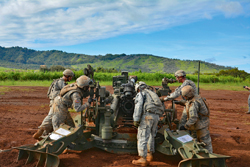 I thought New York winters were cold. If you look up cold in the dictionary, there is a picture of Korea. I had a fantastic group of Medics, Steve Lowrey, Ted Richardson are two who stood out. Ted was a PFC who was court-martialed for getting drunk and stealing a truck and doing donuts on the Officers Club grass. I was glad to recommend him for promotion to SP4. I was also selected for promotion to SFC which meant I had to leave the 11th Artillery. My replacement came in and together we went to Fort Sam for Advanced NCO Course. While in Korea, I was promoted to SFC. I had 11 years in the Army. I thought New York winters were cold. If you look up cold in the dictionary, there is a picture of Korea. I had a fantastic group of Medics, Steve Lowrey, Ted Richardson are two who stood out. Ted was a PFC who was court-martialed for getting drunk and stealing a truck and doing donuts on the Officers Club grass. I was glad to recommend him for promotion to SP4. I was also selected for promotion to SFC which meant I had to leave the 11th Artillery. My replacement came in and together we went to Fort Sam for Advanced NCO Course. While in Korea, I was promoted to SFC. I had 11 years in the Army.
Eventually we have to leave paradise and my time in Hawaii ended. I was sent to Massachusetts where I was an adviser to the New England Medical Guard and Reserve. My job was to travel to a unit and provide advice and training. Training was my life and I loved doing what I did. Finally my 20 years was in and it was time to retire. I know I made a difference because the Guard and Reserve units I trained were called up for Desert Shield/Desert Storm.
The job of an NCO is to train a Soldier to go to war and come home safe. I believe I did my job because not one Soldier that went to war died and they all came home safe. I was there to meet them when they came home.
I was 19 years old when I went into the Army, today, I am 62 years old. I read that at least 1,000 WWII servicemen are passing away daily. I don't know how many of my generation are buying the farm. Some I served with have now passed on. LTC Jerry Bortner, COL Lenard Shlenker, COL Herbert Koenigsbauer, CW2 Dennis Creeden, and CSM David Hogue are a few whose names are on the wall of those who served.
When I'm at the store, someone will come up to me, shake my hand and say, "Thank you for your service". I don't think I did anything special, I just did my job that the Army trained me to do.
In 2007, I had to undergo a quadruple heart bypass surgery. In 2008, I had a stroke. I have a long way to go but, I'm here because I don't believe in giving up. The Army taught me to not surrender and that is what makes me what I am today. Today, I'm a medical coding and medical billing instructor. I also assist my friends and neighbors with their medical bills and I teach the next generation how to work with doctors and patients.
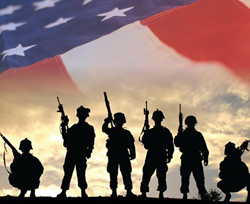 I've been through be all you can be, Army Strong, and now an Army of One! When you put on the uniform, you belong to a group of men and women who know sacrifice and who will put country ahead of themselves. Army, Navy, Marine, Air Force, Coast Guard are all a band of special men and women. We become a brother and sisterhood of our nation's defense. While we wear Blue, OD Green, Camo, Tan, or ACU, under our uniforms we are all one and the same. My generation talks of Pleiku and, Saigon. The current generation knows of Iraq, Iran and, Afganistan, No matter where we go, we always come back to The United States of America. We never give up and we never surrender! I've been through be all you can be, Army Strong, and now an Army of One! When you put on the uniform, you belong to a group of men and women who know sacrifice and who will put country ahead of themselves. Army, Navy, Marine, Air Force, Coast Guard are all a band of special men and women. We become a brother and sisterhood of our nation's defense. While we wear Blue, OD Green, Camo, Tan, or ACU, under our uniforms we are all one and the same. My generation talks of Pleiku and, Saigon. The current generation knows of Iraq, Iran and, Afganistan, No matter where we go, we always come back to The United States of America. We never give up and we never surrender!
I became a medic simply because I worked in a hospital when I got my Dear Steve letter from Uncle Sam. I liked medical care and wanted to continue along that path. When I was at Fort Sam Houston for my 91A combat medic training, we walked into the pecan trees where we learned all about ace bandages. That day was Friday and the USO in San Antonio was having a Halloween Dance. I had everyone give me their ace bandages, so when I got to the USO, I went into the men's room and wrapped my body in ace bandages and walked into the dance as a mummy. Where I normally had no one to dance with, I rarely got off the dance floor. Our barracks was an old wooden world war II left over barracks. Most of the guys in my class were National Guard. One guy was a doctor and I asked him why he wasn't a Commissioned Officer. He told me that the Army didn't commission Chiropractors.
I forgot his name. He was tall, skinny and had his hair cut so short. He sat at his bunk and played Cheech and Chong tapes. I never heard of these guys before but I cracked up every time I heard them, simply because the doctor sounded just like the guys on the tape. He came out of AIT as a SP5. I will never forget one day in class, they showed us films from Viet Nam. One was a man on an operating table. They were peeling his burned skin. he was a black man who was smoking at a POL point and it caught fire. Almost everyone in class ran outside and threw up. I was one of two guys who stayed in class glued to the TV. Somehow blood and gore never made me sick. Most of the guys in my class were sent to Viet Nam. I was sent to Fort Carson as a brand new PFC. I went back to Fort Sam in 1983 for the Medical NCO advance course as a Staff Sergeant promotable. The barracks where I stayed was torn down. The USO downtown San Antonio was gone. The only person who was in the same class as me that I remember was Charles aka Joe Chewning. We both made PFC on the same orders. In 1975, I went to Pinder Barracks in Germany and while there Joe showed up. I was in HHB Divarty, he was in the 1/22 Field Artillery. I was a SP5, Joe was a SP6. He stayed at Fort Sam and went through 91C training. The last I saw, we both left the military as SFCs.
IF YOU PARTICIPATED IN ANY MILITARY OPERATIONS, INCLUDING COMBAT, HUMANITARIAN AND PEACEKEEPING OPERATIONS, PLEASE DESCRIBE THOSE WHICH WERE THE MOST SIGNIFICANT TO YOU AND, IF LIFE-CHANGING, IN WHAT WAY.
There are soldiers that spend their entire career without hearing a shot fired in anger. They wear no medals of valor or combat patch, but, that doesn't mean that they didn't make a contribution to the military. I went into the Army in 1972 when Viet Nam was winding down.
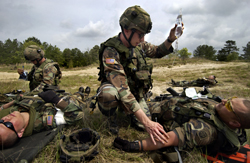 |
| medic |
I was at Fort Carson when it ended. I went to Panama just after Operation Just Cause and my career ended when Desert Shield/Storm started and ended. As an NCO, I spent my career teaching soldiers how to survive war and to come home without injuries. The Soldiers I trained went to Iraq and came home with no injuries. In 1980, I was selected to go to Fort Chaffee in the hot summer to be Section Sergeant of Medics who patrolled the perimeters where the Cubans were kept. Not one Soldier suffered from any injury when I was there. I was awarded the Humanitarian Service Medal. In 1981, while in Hawaii, Hurricane Ewa hit hard causing damage to homes, schools, and Schofield Barracks. My medics and I made sure no one became sick or hurt during the clean up.
I was nominated for my second HSM, but it was never awarded.
OF ALL YOUR DUTY STATIONS OR ASSIGNMENTS, WHICH ONE DO YOU HAVE FONDEST MEMORIES OF AND WHY? WHICH ONE WAS YOUR LEAST FAVORITE?
My first assignment was the 2nd Bn, 20th Field Artillery at Ft Carson. My section Sergeant taught me a lot. I went to the field many times and learned much from it. I was also stationed with the 4th Combat Support Hospital at Ft McClellan, Alabama. I met my best
 |
| 20th Arty Patch |
friend, Janet Harp. I don't know what happened to her and I hope to find her one day. While at Ft McClellan, I was placed on TDY with the 111th MP Company and as a lifeguard at the WAC swimming pool. In Germany I was assigned to HHB Division Artillery at Pinder Barracks. Work was at the small consolidated troop medical clinic. I learned more about patient care from the physicians assistants and the NCOIC, SFC later MSG Mooneyhan. There was constant friction from the Company Commander and First Sergeant and the clinic.
This was where the Cold War was felt when on patrol watching for terrorists such as the Bader-Meinhof Gang. I also went to the 7th Army NCO Academy at Flint Kassern in Bad Tolz. I made it through it with no problems. I came to Germany as a SP5 and left as a SP5. No thanks from anyone for my tour. It was another what the f&*# do we need with another Medic. After Germany Ii went to Fort Sill and the 2nd Bn 37th Artillery. That was a rough assignment with medics not well liked. I spent a lot of time in the field but like Ft Carson and Germany, it wasn't so bad. I went through a rough divorce at Ft Sill. I also taught a lot through the Red Cross.
Through luck I went to Hawaii. I started in HHB Divarty and there was immediate friction between a SP6 and me because he didn't like the idea of another E-6 being in charge of him. I was placed with HHB 2nd Bn, 11th Artillery. Another "what the f*&# do we need with another medic" assignment, only this time I learned my ass smelled like a goat. It was weeks and months of earning the commands respect. I seemed to replace screw up NCOs. There was also lots of field duty and two trips to Korea. I had medics who had court-martials an lots of disciplinary actions but they were good medics who needed a chance and good supervision. I was the only NCO in Divarty who made the SFC list and that pissed off the section officer and NCOIC. I replaced the SP6 who was NCOIC of the consolidated troop clinic and used my experience from Germany to make it the best clinic on base. I had fantastic Medics.
From Hawaii I went to Fort Devens where I was an adviser to the New England Reserve and Guard. I spend every weekend for 6 years away from my family to teach the Medics about training, NBC and soldier skills. These same soldiers went to Desert Storm and came home alive and in one piece. My final assignment was with the 804th Hospital Center, one of the reserve units I worked with. I had outstanding co-workers who went on to become Command Sergeant Majors and an officer who was a Major who is now a full bird Colonel. Here I didn't hear, "what the f*&# do I need with another medic. Not every assignment was paradise. Each was a learning experience. I wasn't the perfect soldier, I didn't make the Sgt Morales or Audy Murphy club. I did my job which was to train my Soldiers.
FROM YOUR ENTIRE SERVICE, INCLUDING COMBAT, DESCRIBE THE PERSONAL MEMORIES WHICH HAVE IMPACTED YOU MOST?
I arrived in Hawaii, assigned to the 2nd Bn 11th Field Artillery. On my first day as Section Sergeant, the Platoon Sergeant who was NOT a medic told me to give him a Medic for a detail. I informed him I had no one to give him as all my
 |
| SFC/Sergeant First Class |
medics were on other details. He said you will give me someone even if it is you. I turned to one of my Medics, Steve Lowrey, my 91C, and told him to take off my SSG pins. I walked up and said here is your man Sergeant. He looked at me with contempt in his eyes and I wore no rank. The First Sergeant saw what I did and said VERNO, GET your a** back in formation and put on your rank. I walked back and my men pinned my stripes back on. I guess I was the first NCO that stood up to this Platoon Sergeant who was the same rank as me.
In 1982, I was home and the First Sergeant called me. He said Sergeant Verno, if anyone asks you about this call, it happened at 2am. I said are you sh*tting me??? He had a tradition to call any NCO who made the promotion list at 2am to notify them. I made the list for promotion to SFC. I was the only NCO in the unit to make the list including the platoon sergeant. The next morning the First Sergeant made the announcement. The Platoon Sergeant told me to take his place. I walked up, saluted him and ordered him to post and I took my place at the head of the Platoon. I probably wouldn't have made it if it wasn't for the men I had. Being a Section Sergeant was an assignment I wont forget.
WHAT ACHIEVEMENT(S) ARE YOU MOST PROUD OF FROM YOUR MILITARY CAREER?
I went from being a field artillery medic to becoming a field artillery medical section sergeant. I learned from the best: SSG Gary Simpson, SSG Phillip Moooneyhan, SSG Adams, SP5 Jim Klitzke and the officers I served under. I took the EFMB test three times before I passed it. In
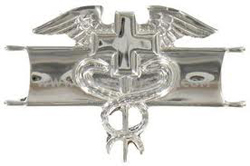 |
| Enlisted Field Medic Badge |
Maine, I trained medics of the Maine National Guard how to take the test. They awarded me a nice plaque which is displayed in my profile picture. The EFMB is a super hard test with a high failure rate. I am proud to say that 90% of those I trained passed the test. In 1974, I was with some of the guys in the barracks and we were on our way to a nightclub to meet some girls. A drunk driver crossed the median and hit our car head on. The other driver wasn't breathing and needed CPR. I performed CPR where he was taken to the hospital. I was nominated for the Soldiers Medal which was downgraded to an Arcom.
I am also proud of my 7th Army NCO Academy at Bad Tolz diploma. I was told that if you can make it through Bad Tolz, you can make it through anything. One of the medical units I trained made me an honorary member of the unit giving me a unique unit patch and Flight Medic wings after they took me up in a flight. At my retirement party, I was given an engraved bedpan. While this sounds weird, it was tradition for it to be awarded to only the General Officer who commanded our unit. Lets face it, how many bedpans do you see on a wall of plaques. The best thing I was given was the friendship and respect of the Army Reserve and National Guard medical units I trained. I never looked at them as weekend warriors. I look at them as fellow soldiers and treated them as such.
OF ALL THE MEDALS, AWARDS, FORMAL PRESENTATIONS AND QUALIFICATION BADGES YOU RECEIVED, OR ANY OTHER MEMORABILIA, PLEASE DESCRIBE THOSE WHICH ARE THE MOST MEANINGFUL TO YOU AND WHY?
There are Soldiers who spend a lifetime in the military and never go to war, receive medals of valor or wear the combat patch on their shoulder. I was at Fort Carson when Viet Nam ended. I was in Panama a few weeks after Operation Just Cause. When Operation Desert
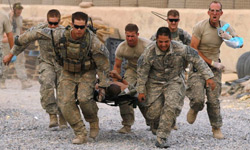 |
| Army Medic |
Shield/ Desert Storm started I was in Boston and my unit wasn't called up. I spent most of my career teaching soldiers to go to war and come home alive and unhurt. I am proud to say that every Soldier that I trained that went to war came home alive and unhurt. There is no medal that can compete with that. I did my job as an NCO and I succeeded. I also took the EFMB test 3 times and passed it. I also trained a group of medics to pass the EFMB. They gave me a plaque that is in my profile picture. Almost 90% of those medics passed the EFMB considering it has a high failure rate. When the Cubans came to America, they were sent to Fort Chaffee, Arkansas. I was sent there to be the NCOIC of the medical team that took care of the Soldiers who stood guard at the gate that ran around the complex. It was in the 100s in the day. Not one soldier was injured during my tenure there. I earned the respect of every medic under my supervision. I was awarded the Humanitarian Service Medal.
One unit I worked with was an Air Ambulance Company. They awarded me a unit patch and flight wings. At my retirement party, my unit, a medical command and control unit, gave me an engraved bedpan. I was told it was only given to the one star commander of the unit, so I was in good company. I enjoyed my 20 years in the Army. Yes, I never made MSG, SGM or CSM. I was in a SGM position. I felt I accomplished my mission. I know I made a difference and that is worth more than any medal you can receive.
WHICH INDIVIDUAL(S) FROM YOUR TIME IN THE MILITARY STAND OUT AS HAVING THE MOST POSITIVE IMPACT ON YOU AND WHY?
In 20 years in the Army, you meet many people. I can mention some here as they remain in my memory: SGM Philip Mooneyhan. (he was SSG Mooneyhan when I met him at Pinder Barracks in 1975. He was SFC Mooneyhan when we processed into the 25th Replacement Detachment at
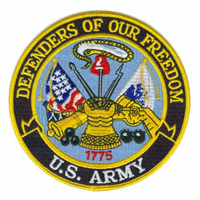 |
| Army |
Schofield Barracks in 1981. He was MSG Mooneyhan when I was with RG Devens in 1985 and I was now SFC Verno. LTC Lenard Shlenker: He was the Battalion Commander of the 2nd Bn, 20th Field Artillery in Hawaii. He came into the Army as a PVT, worked his way up to SGM, Became a Warrant Officer and was commissioned. When I left Hawaii, he was selected for O6 Colonel. He passed away a few years ago. We would be in the field at Pohakaloa Training Area and he set the example for all soldiers. If we had to go to war, he was the officer we would follow without question. If there was a movie star to play him as a soldier, it would be Mel Gibson from, "When We Were Soldiers". CSM Ador Yabut. He was SFC Yabut when we met. You can tell people that you meet if they are destined for greater things. His father survived the Battan Death March during WW2. In my office I had an American Flag that was flown over the USS Arizona when I reenlisted in 1984. I gave that Flag to SFC Yabut in honor of his father.
LTC Jerry Bortner: He was our Division Chief at Readiness Group. He would come to our offices with a cup of coffee in his hand and a soft voice which gave words of praise to everyone. When he moved to his new assignment, we got word that he passed away from a heart attack. CSM Riley Miller: he and I were running buddies during PT in the mornings. he was a Ranger and looked like one. He never had harsh words with anyone. He could chew you out with a soft voice better than someone yelling in your face. If you looked up the word leadership, his picture would be there. SSG Gary Simpson: He was my section sergeant at Pinder Barracks in Germany. I learned how to be a Staff Sergeant and a good one from him. When we had to go to the field for Reforger, he was admitted to the hospital with appendicitis which meant I had to be all by myself with no help from anyone. SSG Robert Adams: He was my very first section sergeant when I was assigned to the 2nd Bn 20th Field Artillery at Fort Carson. I learned more about being a field artillery medic than what I learned at Fort Sam. He eventually made it to being Command Sergeant Major of AMEDD. SFC Frank Roy: He is a National Guard medic located in Maine. Frank is an NCO's NCO. The soldiers in his unit give him the highest respect. He earned my respect through his actions and deeds.
SP4 Janet Harp. After Fort Carson, I was assigned to the 4th Surgical Hospital at Fort McClellan. SP4 Harp looked like a soldier with starched fatigues and spit shined boots. She was the best of the best in the unit. I knew that I had to raise my personal standards to her high level of standards. Doing so allowed me to become Soldier of the Month and to be promoted to Sp5 not long after my assignment. MAJ Hoyt Blackburn: He was the commander of the 4th Surgical Hospital which became the 4th Combat Support Hospital. Under his command, we went to the field a lot and when there we trained under field conditions. He had us find and treat casualties and carry them to safety under realistic combat conditions as he could make. he took the Viet Nam combat medics and used them as aggressors so we would know what to do. Maj Blackburn passed away as Commander. She was the best of the best in the unit. I knew that I had to raise my personal standards to her high level of standards. Doing so allowed me to become Soldier of the Month and to be promoted to Sp5 not long after my assignment. MAJ Hoyt Blackburn: He was the commander of the 4th Surgical Hospital which became the 4th Combat Support Hospital. Under his command, we went to the field a lot and when there we trained under field conditions. He had us find and treat casualties and carry them to safety under realistic combat conditions as he could make. he took the Viet Nam combat medics and used them as aggressors so we would know what to do. Maj Blackburn passed away as Commander.
SSG Snow. I don't remember his full name. He was my tactical NCO at the NCO Academy at Bad Tolz, Germany. I didn't have any money while there because I wasn't paid yet. I went to Bad Tolz just after I arrived in Germany and never completed my in processing. He understood this. At the graduation dining in, he paid for my meal. Not once did I ever have to shine the Autobahn which was a black strip down the center of the floor. Punishment was to spit shine the autobahn with a cotton ball and shoe polish. I was told that if you can make it through Bad Tolz, you can make it through anything. He was a leader who inspired everyone that went through the course. COL Robert Tabaroni: He was Major Tabaroni when I met him at the 804th Hospital Center. He too never raised his voice and he treated you like you were his son. The respect he was held in by everyone who served under him was of the highest caliber. There are many more people, but time hasn't been kind to them in my memories. I want to recognize the soldiers of the New England Army Reserve and National Guard Components. You hear them called Weekend Warriors. The men and women I met could best any Active Duty soldier. They were called up for Operation Desert Shield and Desert Storm as well as Iran, Afganistan and the other conflicts of the 1990s. To me their motto is Mission Accomplished. To them I owe my freedoms and my undying gratitude.
CAN YOU RECOUNT A PARTICULAR INCIDENT FROM YOUR SERVICE WHICH MAY OR MAY NOT HAVE BEEN FUNNY AT THE TIME, BUT STILL MAKES YOU LAUGH?
When I was in Hawaii, assigned to the 2nd Bn, 11th Field Artillery, we were given a mission to go to Hickam Air Force Base, set up our aid station and participate in a mass casualty exercise. We arrived and my men had the aid station set up faster than
 |
| MP |
I've ever seen it go up. The medics were SP5 Steve Lowrey, PFC Ted Richardson, SP4 Phil Kaplan and others I don't remember. There is a sense of pride that fills you when you see your men do what they are supposed to do with little supervision. We stood around watching all these injured people laying on the grass next to the runway. No one came to us to tell us anything. Without any word everyone got up and walked away. It looked like something from a zombie movie, people with cuts, gashes, blood and bandages walking back and forth. We were told it was now over with, so we packed everything back up and returned to base.
In 1974, I was at Fort McClellan. I was told I would be doing a 90 day TDY with the 111th Military Police Company. I'm in my fatigues, with an MP Arm Brassard and shiny helmet liner all black with the words MP on the front and 111th MP on the side. My partner and I stopped for coffee. He also bought a snickers bar. We pulled up to the base bank to check it. My partner is standing with a coffee in one hand and a candy bar in the other. I checked the door and found it unlocked. We went inside. I'm holding my 45 ready to shoot if shot at. My partner looks like Barney Fife. No one was in the bank, someone forgot to lock it. Before our supervisor shows up my partner puts the candy bar in his pocket where it melted.
WHAT PROFESSION DID YOU FOLLOW AFTER YOUR MILITARY SERVICE AND WHAT ARE YOU DOING NOW? IF YOU ARE CURRENTLY SERVING, WHAT IS YOUR PRESENT OCCUPATIONAL SPECIALTY?
When I left the military, I started working as an office manager at a health clinic. My training and experience as a field artillery medic and section sergeant prepared me for this. I then became a medical coder and biller. I pretty much do what I did as an adviser but I am paid better for it. I go overseas such as with Guam and Costa Rica but now I need a passport. I teach classes in coding and billing. I use my leadership skills in my classes to manage them and my students.
WHAT MILITARY ASSOCIATIONS ARE YOU A MEMBER OF, IF ANY? WHAT SPECIFIC BENEFITS DO YOU DERIVE FROM YOUR MEMBERSHIPS?
I am a member of the AMEDD Regiment Association.
IN WHAT WAYS HAS SERVING IN THE MILITARY INFLUENCED THE WAY YOU HAVE APPROACHED YOUR LIFE AND YOUR CAREER?
I have a never give up and never surrender attitude. I believe in duty, honor and country. I am not perfect, but I do my best to set an example of being the best. In 2007, I had a heart attack and underwent open heart surgery. An hour after coming out of surgery, I was up and walking. In 2008, I had a stroke. I had to relearn how to walk, how to talk, how to act around people and learn the day to day life skills we take for granted. When you look at me, I look and act normal. I'm told that a second stroke is going to happen and it will take my life. I don't worry about that because if I wake up, that is a day I am given to accomplish something. I don't waste what I am given. The Army taught me to never give up and I don't. I cant run anymore, but I can walk. When I do my daily 4 mile walk, my neighbors see me and join me. As a medical biller I go up against insurance companies when they deny the medical claims I send them for payment. They think that I won't fight back or if I do I will give up. I don't give up or surrender. This philosophy is what I try to teach others. out of surgery, I was up and walking. In 2008, I had a stroke. I had to relearn how to walk, how to talk, how to act around people and learn the day to day life skills we take for granted. When you look at me, I look and act normal. I'm told that a second stroke is going to happen and it will take my life. I don't worry about that because if I wake up, that is a day I am given to accomplish something. I don't waste what I am given. The Army taught me to never give up and I don't. I cant run anymore, but I can walk. When I do my daily 4 mile walk, my neighbors see me and join me. As a medical biller I go up against insurance companies when they deny the medical claims I send them for payment. They think that I won't fight back or if I do I will give up. I don't give up or surrender. This philosophy is what I try to teach others.
BASED ON YOUR OWN EXPERIENCES, WHAT ADVICE WOULD YOU GIVE TO THOSE WHO HAVE RECENTLY JOINED THE ARMY?
The Army is a life experience that will be with you forever. You can take what you learned to make yourself and those around you better. Listen to your leaders and done be afraid to lead yourself. Take any failures and make them successes. My grandfather was in the Army in World War II. When I visited him, he said, "Steven, no matter what you do, keep your eye and ears open and your mouth shut". He told me to listen to my Sergeants and do what they tell me to do. He also said he didn't care if I was awarded the Medal of Honor. He felt that the Good Conduct Medal was the medal that meant anything. He died in 1975 when I was at Fort McClellan. in World War II. When I visited him, he said, "Steven, no matter what you do, keep your eye and ears open and your mouth shut". He told me to listen to my Sergeants and do what they tell me to do. He also said he didn't care if I was awarded the Medal of Honor. He felt that the Good Conduct Medal was the medal that meant anything. He died in 1975 when I was at Fort McClellan.
I earned 6 Good Conduct medals.The only thing he hated was Spam. My Uncle Andrew Archie was also in the Army, he made E-7 when he retired. None of us knew this. He was a quiet man and never spoke anything about his time in the Army. After my dad died, I learned he was a PFC in the Army National Guard. He too never spoke about it. Just before he died he told me he was proud of me. If you meet someone who served, thank them and ask them about their time and try to record it for posterity. We lose hundreds of our WW II soldiers every day. They don't like to talk about their time in the Army, a simple thanks goes a long way. To me, I didn't do anything special. I did what I was expected to do. If you serve, I want to say Thank You for being there for all of us.
IN WHAT WAYS HAS TOGETHERWESERVED.COM HELPED YOU REMEMBER YOUR MILITARY SERVICE AND THE FRIENDS YOU SERVED WITH.
I have found a few of my past comrades, some have found me. I'm still looking for a few. I hope that they will contact me.
|
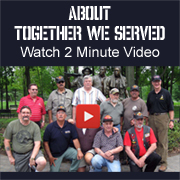

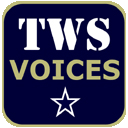
Read Other Interviews in the TWS Voices Archive | Share this Voices Edition on:


  |
|
TWS VOICES
TWS Voices are the personal stories of men and women who served in the US Military and convey how serving their Country has made a positive impact on their lives. If you would like to participate in a future edition of Voices, or know someone who might be interested, please contact TWS Voices HERE.
This edition of Army Voices was supported by:

Army.Togetherweserved.com
For current and former serving Members of the US Army, US Army Reserve and US Army National Guard, TogetherWeServed.com is a unique, feature rich resource helping Soldiers re-connect with lost Brothers, share memories and tell their Army story.
To join Army.Togetherweserved.com, please click HERE.
| |